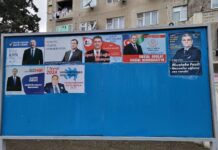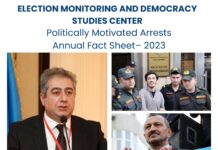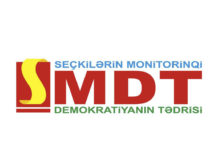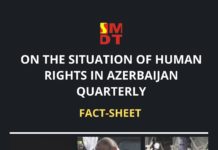The Election Monitoring and Democracy Studies Center (EMDS) presents a quarterly fact-based summary of information on the human rights in Azerbaijan based on alternative and open sources.
EMDS is a non-governmental organization operating in Azerbaijan to promote human rights and democratic institutions.
Quarterly Summary of Human Rights
The EMDS recorded 384 human rights violations in the fourth quarter of 2019 based on 244 facts collected in the country as a result of monitoring human rights cases and investigating citizens’ complaints. Though this figure is lower in comparison to previous quarters, the number of human rights violations according to respective categories remained similar. Violations were recorded in all categories of human rights and complaints about any type of violations did not decrease significantly. In particular, violations regarding fair trial, freedom of expression, freedom of assembly, and social rights prevailed throughout the quarter.
During the quarter, the working group on Unified List of Political Prisoners reported that 112 people had been imprisoned for political reasons. The ban on access to the websites of independent media outlets still remains. Several rallies and pickets took place throughout this quarter and it was marked by numerous violations, particularly related to freedom of assembly, freedom of expression and right to liberty and security. Municipal elections took place in the last quarter of 2019 as well, and EMDS states that the interference of executive bodies in the low-key election process and the lack of political will have limited the ability of the people to freely express their will1. Elections, including election day, was marked by numerous irregularities.
Procrastination, arbitrary decisions made by respective state bodies, persecution of political activists, and unfair court decisions formed the basis for complaints from the regions. Other factors that led to violations include inaction of corresponding state bodies regarding inadequate living standards in different regions, bureaucratic obstacles to accessing social security, emergency situation due to lack of control over felling, inaction of local executive bodies and the police or their unlawful actions.
For the full report, download the file here.


















